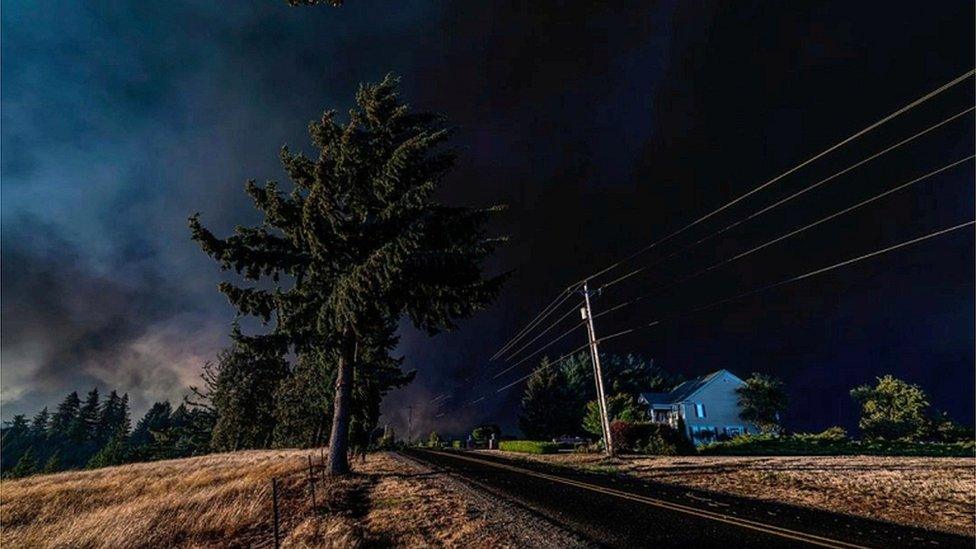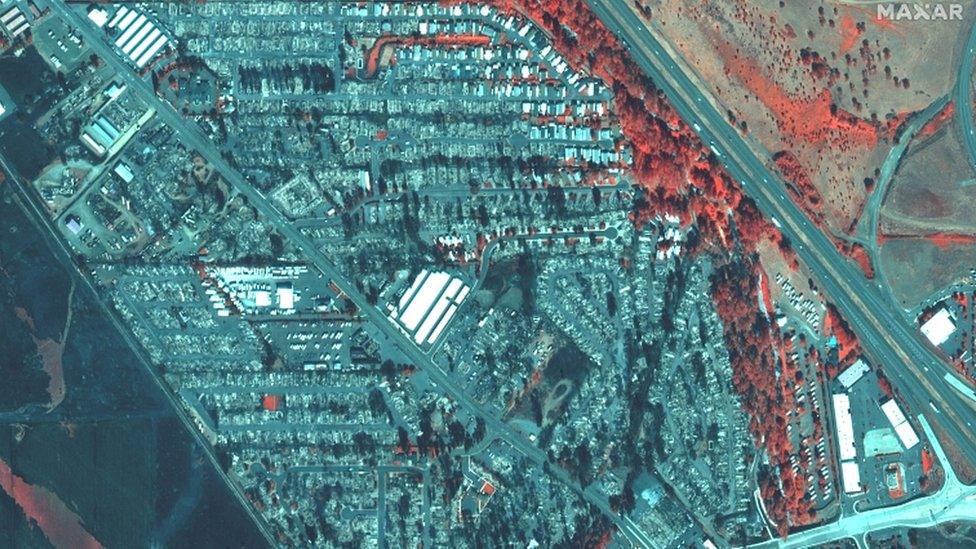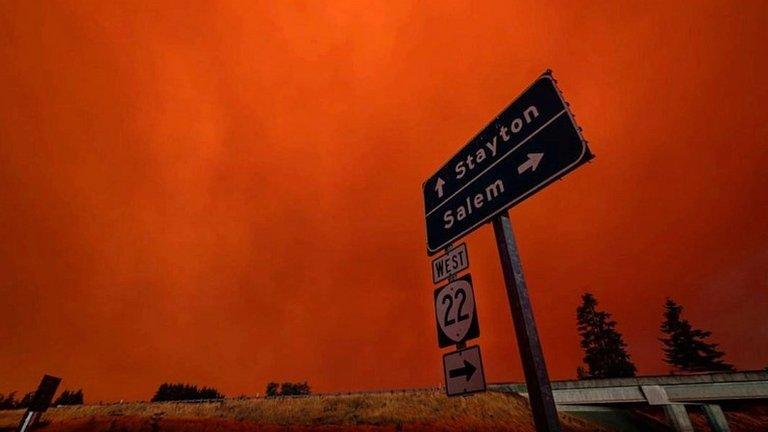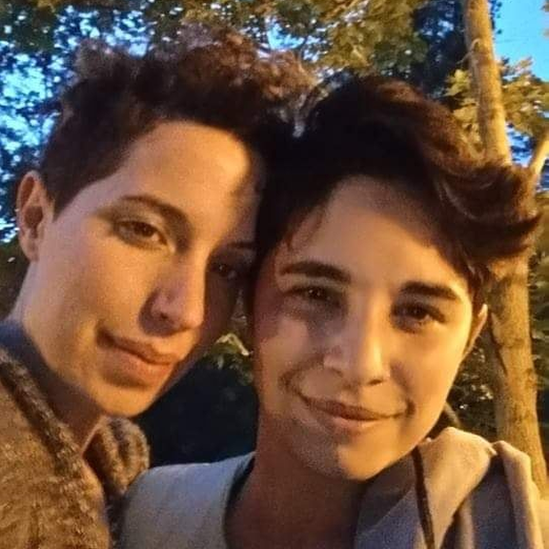US West Coast wildfires: Nearly 100 fires run rampant
- Published

Oregon Governor Kate Brown says the state could see the greatest loss of life and property from wildfires in its history
Western US states are battling nearly 100 wildfires that have caused at least seven deaths, displaced thousands and destroyed whole towns.
California, Washington state and Oregon have been the hardest hit by the blazes, fuelled by heat waves and windy conditions.
Oregon's governor said this "could be the greatest loss of human life and property" to fires in state history.
Nine other states in the region are also seeing wildfires raging.
Three deaths have been blamed on the wildfires in Oregon, with another three in California and one in Washington.
According to the National Interagency Fire Center, there are 96 large fires in the western US. More than 3.4m acres have burned so far, with tens of thousands of acres burned in the last day in California, Oregon and Washington.
Oregon officials said several towns have burned down in the fires, as winds gusted to 45mph (72km/h).

A colour infrared satellite image shows destroyed homes after the Alameda Fire in Phoenix, Oregon: burned vegetation and property appear grey, surviving vegetation is in red
The fires are blazing across Oregon's valleys and along the coast, causing mass evacuations.
One Oregon evacuee, Jody Evans, told NewsChannel 21, external about her ordeal.
"Fire on both sides, winds blowing, ash flying - it was like driving through hell," she said.

Red sky and thick smoke in Salem City, Oregon
In neighbouring Washington, Governor Jay Inslee said on Tuesday that more than double the acreage had been torched in the previous 24 hours than had been burned during all of last year in his state.

Saying goodbye to our first home
Sam Elm and her partner, Micah, lived in Phoenix, Oregon. Sam shared her experience fleeing from the wildfire - and saying goodbye to their home - with BBC OS.
A fire started in a nearby town and began encroaching. "It took our home," she says. "It was an intense experience."
"We were listening to the scanners...we were hearing it get closer and closer.
"At a certain point we got a call saying 'you need to leave right now.' It was raining ash on - everything."
As they were about to leave, Sam says her wife called her upstairs to a wall in their home decorated with the signatures of friends, and members of their community - which Sam says was a "point of pride" for them.
"She slams her hand on the wall - because we've never signed our own wall, because it was our house we lived in - she traced her hand, she slammed my hand on the wall, she traced my hand, she kissed me and said: 'Don't forget this was our first home. And we left."

Sam Elm (left) and her wife Micah Elm had their first home burn down in a fire
Sam adds that she and her wife were the lucky ones. "Not everybody got to say goodbye to their homes - we did. Our pets are with us. We know people whose pets got stuck in their houses...we know people that are missing."
Sam and Micah are currently staying with a friend, hoping to get a hotel room through insurance.
But she doesn't know what six months down the line looks like now that they've lost their home. She says she has no clue "how to traverse any of this".

What's happening in California?
California - in the middle of a 20-year mega-drought - is experiencing more than two dozen wildfires, including three of its five largest ever.
Five ways that show the scale of California's 2020 wildfires
The sheriff of Butte County, north-east of San Francisco, said two people had been found dead at one location and a third elsewhere.
One of the three was a motorist who was apparently trying to escape the Bear Fire, police told local media. The Bear Fire has scorched more than 200,000 acres since it began in mid-August.
Wildfires rage across thousands of acres in California
The latest deaths mean that fires in the state have now killed at least 11 people since last month. More than 2.3m acres have been burned this year in the state.
California Highway Patrol Officer Ben Draper told the East Bay Times, external that one of the fatalities discovered on Wednesday was someone who seemed to have been trying to flee the wildfire.
Why has the San Francisco sky turned orange?
He said investigators believe the unidentified driver had fled his or her car after driving towards a ditch before being overcome by the smoke and flames.
"Somebody was just attempting to flee and it just didn't work out," he said.
Why are the fires so severe?
The slew of blazes across the region were sparked by a number of causes, from downed power lines to a gender reveal party gone wrong. But why have the wildfires become so bad?
There has been a rise in the number of extreme weather events, which experts say is part of a trend caused by bigger climate changes. While climate change itself is not the cause of the blazes, it helps set the conditions for massive wildfires.
"It's like night-time in the daytime": San Francisco's skies turn orange from wildfire smoke
The Western US has recently seen serious heat waves, including a day which led to what may be the highest temperature ever reliably recorded on the planet - 130F (54.4C) - in California. The last week brought another heat wave, and southern California saw record-high temperatures. These hot, dry conditions have made the region ideal for large wildfires.
Record cold temperatures and even snow in neighbouring states, like Colorado, this month have also brought damaging winds.
In addition to climate change, other factors like more people living in wildfire-prone areas and brush overgrowth have also contributed.